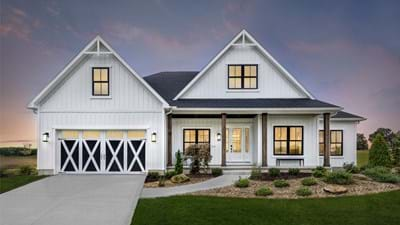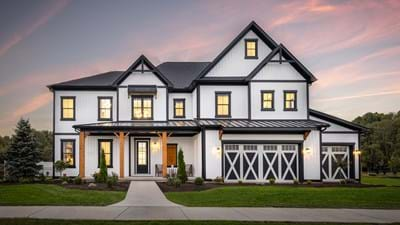The ancient Roman poet Horace once said that “This was my prayer: an adequate portion of land with a garden and a spring of water and a small wood to complete the picture.” That may be the desire of many who look to build their ultimate home on a desired piece of property sought out with care and great discernment. How that comes to fruition is another matter entirely.

Perhaps first and foremost, “anyone looking for land on which to build their ‘dream home’ should use the same metrics as someone buying an existing property,” explained Helene Nseir, Realtor, Berkshire Hathaway HomeServices The Preferred Realty. “Look for land within your desired area. If a particular school district is important, search out land in that district. If proximity to work is a key factor, make that your parameter. If you would buy a perfect home in a given township, then search only in that sector. You can become overwhelmed just searching ‘vacant’ land because there are always pockets of an acre here or there that someone is trying to sell.” She suggested a look at the West Penn Multi List where there is a section dedicated to the search for land including vacant land or land with a farm or structure on it. According to LandWatch, a leading online marketplace for buying and selling properties across the United States, a reported $742 million of rural land listings are for sale in Pennsylvania’s Pittsburgh and Countryside Pennsylvania regions covering a total of 18,617 acres of land for sale with more acreage no doubt listed elsewhere. Nseir further noted that searching local newspapers as well as canvassing a desired area may help, given that some owners may sell their properties independently. “People often look for privacy and become enamored with a parcel of land that affords them privacy,” she added. “But a remote piece of land may come with extra expenses and surprises when it comes to development. Every seller should provide you with information regarding the land they are selling, whether with a real estate agent or if they are selling it themselves.” Realtors and builders, too, can help individuals look for land. Jeff Costa, Founder and Operating Manager of Costa HomeBuilders, a custom home builder based in Elizabeth, Pa., remarked that desirable land varies depending on a client’s needs and wants. “We build all over the Pittsburgh region and southwestern Pennsylvania and found that different areas are most desirable based on need,” he said. “Some are looking for a particular school district, some want a more rural setting, others want easy access to the city, as examples, so it ranges from customer to customer.” But the overarching piece of advice is this: before making a land purchase, Do Your Homework. In a February 21, 2023 article titled Buying Undeveloped Land: The Pros and Cons (RocketMortgage.com), author Lauren Nowacki shared that understanding what raw or undeveloped land is and how you can use it and purchase it becomes imperative. Among the reported “pros,” she cited flexibility in the land’s use; less competition when it comes to number of buyers; fewer maintenance costs if the property does not have buildings on it, and its potential for return on the investment. Conversely, buying raw land may mean a larger down payment due to risk (such as land not ready for a build and maybe no specific plans for use); zoning restrictions; permitting costs; easements, and the amount of time it may take to prepare the land. Nseir added that in a neighborhood, there are usually recorded covenants that determine what can be built. “These covenants are designed to protect the integrity of the community and also to assure like properties there,” she said. “In offsite properties, you may have more freedom, but you also need to take a look around and see if your dream home fits with the surrounding landscape. Quite often, there’s no zoning and, for example, you may build your $600,000 dream home only to find a tire recycling center moving in behind you.” Reviewing a copy of the deed before entering an agreement helps, as it often includes restrictions on what can be done with the land and tells you if there is an easement for a gas line, or if someone else has any interest in the property. “Call the municipality to gauge any restrictions. Look at the land to determine how easy it will be to have a driveway come off the land. Very often, PennDOT requires a highway permit to exit the driveway, making sure there is enough site distance for exiting. There is much to consider. Sometimes, it appears to be a deal because the cost is less, but it can also be a bag of surprises.”

Jeff Costa advised checking for public utility availability, how accessible they are, and at what price, along with a valid percolation (perc) test for the property; examining any easement issues; flood plan information, and wet lands or environmental issues. Further, ask if a highway occupancy permit is needed and/or can be approved as well as any soil information. “Land is easy to buy but customers need to do their due diligence before purchasing a lot,” he said. “Getting your builder involved before the purchase is always recommended.” Helene Nseir echoed those same concerns and added that “the land itself must fit the type of home you want to build and to that I would always suggest you have a house plan and a builder who can tell you if the land conforms to what you want to build.” Scott Lantz, General Manager for Schumacher Homes, a custom home builder headquartered in Greensburg, Westmoreland County, asserted that knowing how to search for land is half the battle. “The other half is knowing what to look for in a lot,” he said. “Make a list of what is most important to you and your family and use it to guide your decisions. Is it important to live in a community/development or would you like more land in the country?” He continued that deciding this will help weed out potential lots that aren’t a good fit. Next, he advised considering utilities, zoning, surveying, flood risk and site preparation. “The further your home is from ‘civilization’, the more effort it will take to reach the grid and have utilities such as electricity and water. To build a house, the land must be zoned for either residential or agricultural use. If it’s not, you’ll need to apply for a variance, which isn’t guaranteed. He also commented that site preparation plays a large role in building your custom home, and it’s important to know what it will take to get a piece of raw land ready for construction. He added that it’s important to tour the land before a purchase to make sure there aren’t any unwelcome surprises. “No piece of land will be 100 percent perfect, so it’s important to keep these tips in mind when evaluating lots,” he concluded.
Financing a loan for land purchase also requires some serious thought and consideration. If purchasing undeveloped (raw) land, you may need a land loan, which often comes at a higher interest rate and a greater down payment given the risk involved for the lender.





Shelly Gaffney, Senior Vice President, Business Development at Commercial Bank & Trust of Pa. (CB&T), shared that land on which there are no immediate plans to build would come at a higher interest rate. “At CB&T, we would lend up to 60 percent Loan to Value and the interest rate would be higher if you were not building on the land within the next year,” she said. “If the land is going to be built on within the coming year, CB&T would offer a 90 percent Loan to Value and the current mortgage rates at the time.” Helene Nseir added that new construction loans are structured much differently than an existing loan. “So many times, the bank wants you to own the land outright. You buy it and then you can use it as equity for the construction loan that is usually divided into ‘draws’”, she explained. “The bank then approves an amount for the construction and once the builder completes the pre-determined work, the bank releases a pre-determined amount and the buyer pays interest on only that amount and it proceeds that way until the home’s completion. Then the loan converts from a construction loan to a mortgage.” Gaffney continued that construction mortgage loans are approved with the same criteria as purchase mortgage loans. “In addition to the financial information, you also need to have a survey, if applicable before closing; plans and specs, and a signed builder contract for your construction loan,” she added. “The land can be purchased before the construction loan is applied for or the build and land can be rolled into one loan.” She also advised that a builder is needed when a client is applying for a construction loan along with builder documents to process a “as completed appraisal” to get the true value of the completed project. “Here, at CB&T, we will lend on the 90 percent Loan to Value of the amount.”
So, how can a builder help make that dream home a reality? “One of the benefits of working with a on-your-lot builder is that we’ll break ground on a customer’s dream home on the land they’ve chosen,” said Scott Lantz, Schumacher Homes. “We build where you want to live whether it’s a rural piece of land or in a development.” He offered a point of note to consider: construction-ready lots require less preparation, but they often work with customers who are looking to build on raw land. To get started, a customer can schedule a no obligation design and pricing meeting that includes pictures, descriptions and itemized pricing to eliminate any unexpected issues that may arise. “When a customer already has land, our process includes assessing the land for homesite preparation,” he added. “This prep work can vary depending on the building site. Each site has its unique characteristics, so some may require trees to be cleared or soil to be brought in or removed.” Once the customer’s homesite inspection is due, that customer is assigned a construction manager who evaluates the site during a lot walk. This allows the manager to view the land up close to determine strategies such as where the home will be placed, utility connections, clearing the lot, and the driveway location. “It’s important to remember that choosing where to place your home on your lot is just as important as choosing the right house plan,” Lantz said. “Every lot is different, but our team helps estimate the cost for site prep and handles all the work before breaking ground.” He continued that if you do not have land just yet but have a lot in mind, the Schumacher team can help advise you on what to look for during the search process. “Before purchasing the land that you plan to build on, we recommend evaluating it first with a professional,” he noted. “By working with a builder like Schumacher Homes, you have a professional who can help evaluate the land and prepare raw land.”
Jeff Costa, Costa HomeBuilders, shared that good lots are difficult to find currently and that those lots are selling at a premium price due to the shortage. “There is always the option of demolishing a home to build on an existing lot in areas that are more desirable but do not have many lot options,” he said. “Our process starts with reviewing the lot to determine what would need to be prepared in order to build. With raw land, some prep costs can be substantial depending on the size, the topography, and where the house will be placed on the lot, which impacts utility runs, driveway length, etc. We recommend you always have a builder review the lot before purchasing to give you a close estimation of the site work involved before moving forward.” When it comes to costs, how can a potential customer begin to plan? Costa advised that it’s helpful to know your budget and what you have to spend going into the process.

“It is usually less expensive to build in a subdivision/housing plan because the site costs are less since the developer handles the clearing, utility runs, storm detention and more,” he said. “When you select a builder for that dream home, you need to have confidence in their process and their team. You need to ask questions and understand what you are getting up front. You have to feel comfortable that they have a team in place who can handle each step of the process and can address any unexpected issues.” Noting that the bones of the house are a vital consideration, he believes that customers should ask about what materials are used and the quality of the labor. “Granite countertops are awesome but they don’t mean much if you have a draft coming through your walls and windows,” he remarked. “Ask your builder to tell you what brands and warranties are included with the products they use and ask about the team doing the work. Our homes feature quality materials and excellent standards, starting around $700,000 plus lot and site costs.” Currently, Costa HomeBuilders have numerous homes under construction in and around the Pittsburgh area. Scott Lantz, Schumacher Homes, counseled that preparing your lot for building typically ranges from 10 to 20 percent of a homeowner’s total building budget. “While there is no one blanket cost, our team of experts can help estimate the costs involved to get your site ready for a new home,” he said. “Since Schumacher Homes provides turnkey construction, we then handle every step of getting the required permits, the lot prep, and the installation of utilities to make things as easy as possible for the customer.” Noting that if the lot is construction-ready, there will be fewer costs associated with the prep as the land will not require much work and, sometimes, utilities are included in the lot. “Having a total budget for your custom home ahead of time can help our team match you with a plan that is within your budget when taking into consideration other costs such as land prep and utilities.” With the help of professionals such as reputable home builders and qualified realtors, a person’s prayer of building that dream home on their piece of land will be answered. NH


